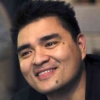Jose Antonio Vargas

Jose Antonio Vargas
Jose Antonio Vargasis a journalist, filmmaker, and immigration rights activist. Born in the Philippines and raised in the United States from the age of twelve, he was part of The Washington Post team that won the Pulitzer Prize for Breaking News Reporting in 2008 for coverage of the Virginia Tech shooting online and in print. Vargas also has worked for the San Francisco Chronicle, the Philadelphia Daily News, and The Huffington Post. He wrote, produced, and directed the autobiographical 2013...
NationalityFilipino
ProfessionJournalist
Date of Birth3 February 1981
In 2007, Zuckerberg announced that Facebook would become a 'platform,' meaning that outside developers could start creating applications that would run inside the site. It worked.
In 2005, MTV Networks considered buying Facebook for seventy-five million dollars. Yahoo! and Microsoft soon offered much more. Zuckerberg turned them all down.
To me, politics is culture. I became a journalist, and later a filmmaker, to get to know my new country and my volatile place in it as a gay, undocumented Filipino-American.
Undocumented people get arrested all the time. I get arrested, and it's front-page news. I feel guilt.
Facebook's privacy policies are confusing to many people, and the company has changed them frequently, almost always allowing more information to be exposed in more ways.
Facebook's headquarters is a two-story building at the end of a quiet, tree-lined street. Zuckerberg nicknamed it the Bunker. Facebook has grown so fast that this is the company's fifth home in six years - the third in Palo Alto. There is virtually no indication outside of the Bunker's tenant.
When I was younger, I didn't understand how a mother could put her son on a plane and just say, you know, 'Here you go, I'll see you later.' And she never followed, she never came.
When people saw that the film was called 'White People,' many got very defensive. I've been getting some very interesting emails - and I'm used to hate mail, believe me. I think this idea that we grouped white people together is offensive to people.
While in high school, I worked part time at Subway, then at the front desk of the local YMCA, then at a tennis club, until I landed an unpaid internship at 'The Mountain View Voice,' my hometown newspaper.
When I was a kid, I resented my grandparents not speaking the perfect English I wanted to speak.
The fact of the matter is, this country is not going to deport 11 million undocumented immigrants. What are we supposed to do with them? What are we supposed to do with these kids?
When I'm writing, I can always play around with tense. I can always make past present. I can always kind of manipulate, and I can always be delusional in a way that's completely self-serving. With film, it's like, the camera can't really lie. It can manipulate to a certain extent.
On the surface, I've created a good life. I've lived the American dream. But I am still an undocumented immigrant.
I think the hardest stories we tell are always the ones about ourselves. And as a journalist, I was taught that I'm never supposed to put myself in the story. So I spent what, 11, 12 years of my life writing about other people so I don't have to face my own life.